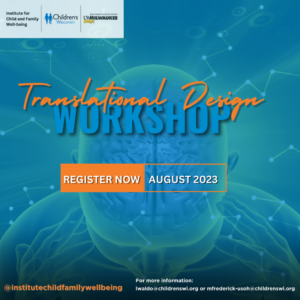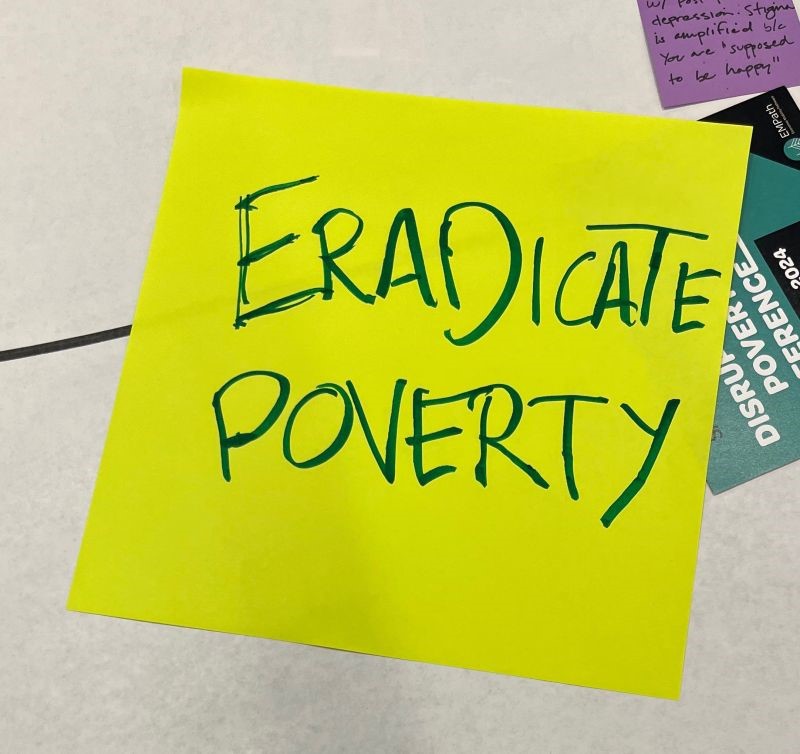The mission of the Institute for Child and Family Well-Being is to improve the lives of children and families with complex challenges by implementing effective programs, conducting cutting-edge research, engaging communities, and promoting systems change.
The Institute for Child and Family Well-Being is a collaboration between Children’s Wisconsin and the Helen Bader School of Social Welfare at the University of Wisconsin-Milwaukee. The shared values and strengths of this academic-community partnership are reflected in the Institute’s three core service areas: Program Design and Implementation, Research and Evaluation, and Community Engagement and Systems Change.
In This Issue:
- Meet the ICFW
- Program Design and Implementation
- Research and Evaluation
- Community Engagement and Systems Change
- Recent and Upcoming Events
Meet the ICFW
Meet our Research Assistants

Theresa Beaumier is a research assistant for the Institute for Child and Family Well-Being. She is working on the Healing Adversity and Trauma through Conversation and Hope (HATCH) project.
Theresa is a doctoral student in Sociology at UW-Milwaukee. She is interested in sociology of mental health, environmental sociology, and mixed methods research, as well as conducting research in community settings. Theresa holds a BA in Religious Studies from St. Norbert College and an MA in Social and Applied Philosophy from Marquette University.

Sara Chopp is a Research Assistant and Project Coordinator currently engaged with the Milwaukee Equity Action Plan and Family Foundations Home Visiting (FFHV) evaluation.
She is dedicated to fostering diversity, equity, and inclusion (DEI) within organizational cultures. She has a keen eye for scrutinizing organizational policies and practices through the lens of DEI standards, providing valuable insights and recommendations for their enhancement. She is an ABD in UWM’s Educational Psychology PhD program, holds a Master’s in Public Administration, and earned a Bachelor of Arts in Communication.

Xiyao Liu is a research assistant with the Institute for Child and Family Well-being. She is working on the Families and Children Thriving Study (FACT) and Strong and Stable Families (SSF) project.
Xiyao is a doctoral student in Social Welfare at the University of Wisconsin-Milwaukee. Her research interests encompass areas such as adverse childhood experiences (ACEs), child and adolescent developmental outcomes, racial and ethnic disparities, poverty, and intersectionality. Xiyao holds a Master of Social Work (MSW) from both the University of Wisconsin-Milwaukee and the Chinese University of Hong Kong.
Meet Our New Predoctoral Fellow

The ICFW continues to support a predoctoral fellowship training program that provides mentorship and funding to doctoral students whose research can be applied to promote better and more equitable outcomes for children and families.
We are proud to announce our newest predoctoral fellow Daniela Kaiser. Her research broadly explores how contact with criminal justice and child welfare systems shapes the wellbeing of families and children, as well as a wide array of collateral effects brought about by the involvement with these systems. Daniela holds a master’s degree in Criminological Research from the University of Cambridge and is currently a Criminology, Law and Society doctoral candidate at the University of California, Irvine.
Program Design and Implementation
The Institute develops, implements and disseminates validated prevention and intervention strategies that are accessible in real-world settings.
Translational Design Workshop
Do you have a longstanding problem facing the families in your community?
We all know that accomplishing a positive shift in mindsets is both lofty and daunting, but essential to everlasting policy and systems change. If your organization is seeking innovative ways to influence the narrative surrounding child welfare, poverty or other systemic issues in your community, this workshop is for you!
The Translational Design workshop is a six-week training course that is structured to meet the needs of busy schedules. At your own pace, you will complete weekly on-line activities and exercises that are focused on creating tangible opportunities for knowledge application. Each weekly session will be supplemented with instructor-led practice sessions, where you can ask questions and build a Community of Practice with your peers.
Translational Design is a process that draws on different disciplines, from Human Centered Design, Common Elements Approach, and Implementation Science into a three-phase process.

Learning Objectives:
- Brainstorm and design solutions to longstanding challenges
- Engage content and context experts in the design and improvement processes
- Build a Community of Practice which can serve as a learning collaborative and supportive capacity-builder
- Identify and frame the challenges concerning complex issues that have been standing in the way of program- and client- level success
- Move your program or current research more quickly into practice
Join us as we create meaningful prototypes and tangible solutions.
Registration fee: $400 for a team of up to four people. Scholarships available.
If you are interested in joining the next cohort in early 2024, contact Megan Frederick-Usoh at mfrederick-usoh@childrenswi.org or Luke Waldo at lwaldo@childrenswi.org.
Research and Evaluation
The Institute accelerates the process of translating knowledge into direct practices, programs and policies that promote health and well-being, and provides analytic, data management and grant-writing support.
Recent ICFW Publications
A recent publication found a large portion of child welfare involved caregivers who reported needing mental health or substance misuse services did not receive services. Frequent contact with CPS workers, adverse experiences in adulthood, and court involvement in CPS case predicted service uptake.
Community Engagement & Systems Change
The Institute develops community-university partnerships to promote systems change that increases the accessibility of evidence-based and evidence-informed practices.
Strong Families, Thriving Children, Connected Communities Initiative – Economic Stability Critical Pathway
Economic security plays a crucial role in reducing stress, contributing to a sense of well-being, and fostering healthy parenting and parent-child interactions. When discussing the biggest challenges that put families at risk for child welfare involvement due to neglect, SFTCCC participants consistently pointed to ‘poverty’, its associated struggles, and the stress it generates as the key obstacles to family functioning and child well-being. Child neglect is more likely in families that are experiencing an overload of stress related to the weight of poverty, which can overload parents’ abilities to provide the supportive relationships children need.
The Ripple Effects of Poverty on Parenting and Family Dynamics
Since the first roundtable, SFTCCC participants have identified poverty as the biggest challenge facing the families they work with, one that people working in family preservation programs feel like they lack tools to address. The stressors of poverty are complex and represent a constellation of challenges, from housing insecurity, economic shocks, lack of access to childcare, food insecurity, and navigating the benefits cliff.
While Wisconsin law states that family separation due to neglect should only happen for reasons other than poverty, economic insecurities are common among families with children entering the foster care system. Nationally, nearly 85% of families investigated by CPS earn below 200% of the poverty line. Children from economically insecure households are more likely to face maltreatment and neglect (Drake, 2014).
Poverty can lead to chronic stress, which negatively impacts parenting and parent-child interactions.
High levels of stress caused by poverty can result in parents becoming more irritable, less patient, and exacerbate mental health and substance use challenges. Parents experiencing financial strain may have limited time and resources to focus on their children’s needs, affecting the quality of their interactions.
When parents are overloaded by the stressors of poverty, it can negatively affect their ability to engage in healthy parenting practices, it harms their mental health, child development, and wellbeing. This includes being less responsive to their child’s needs, having difficulty setting boundaries, and exhibiting harsher discipline methods.

Breaking the Cycle: Supporting Family Economic Stability
To improve parent-child interactions and overall parenting, it is essential to address the root causes of poverty-induced stress and support family economic stability. This includes increasing access to resources such as affordable housing, healthcare, and education, as well as implementing policies to reduce income inequality.
Learning from innovative new initiatives in this space, broadening our network, and collectively advancing policy solutions are all opportunities for SFTCCC participants to contribute to moving forward. By creating a more supportive environment for families, we can help alleviate the stressors associated with poverty, thereby promoting healthy parenting and fostering stronger parent-child relationships.
Learn more about our Strong Families, Thriving Children, Connected Communities’ Critical Pathways here.
Overloaded: Understanding Neglect Season 2 Coming Soon!
By Luke Waldo
We currently live in a time where over 90% of Americans are connected to each other and the world through smart phones, internet access, and social media.
At the same time, the US Surgeon General released a report this year titled “Our Epidemic of Loneliness and Isolation”, which calls out the fact that 1 in 4 Wisconsinites report that they only sometimes or never get the social and emotional support they need; and only 4 in 10 American adults said that they feel very connected to others in 2022.
In Wisconsin, Native American and Black families make up about 13% of our population, and yet make up 27% of all reports to Child Protective Services (CPS), 34% of all CPS investigations, 38% of all family separations, and a staggering 47% of group home placements.
Also, Native Americans and Black professionals in the three systems that contribute to the majority of reports to CPS – the education, law enforcement, and healthcare systems – are underrepresented, in some cases as low as 5% of that system’s workforce.
How might we address the root causes of poverty-induced stress and support family economic stability?
How might we strengthen social connectedness for our communities, caregivers, and children?
How might we foster authentic and inclusive community collaboration among our systems and organizations, service providers, communities, and families, so that we can effectively address the historical and current inequities that have resulted in disproportionate rates of family separations among families of color and poor families?
And how might we diversify and support our workforce and elevate and empower the contribution of families and staff with lived experience in our prevention services and the child welfare system to advance equity and justice for all families?

In season 2 of Overloaded: Understanding Neglect, we will be confronting these conflicting realities and complex questions as we explore our Strong Families, Thriving Children, Connected Communities’ four Critical Pathways, our roadmaps for discovering and developing innovative solutions to these wicked problem. Through the first year of our Strong Families initiative, which included season 1 of this podcast series, we were able to align the insights and experiences of those who know these issues best with the evidence that has shown promise in advancing meaningful solutions. This collaborative effort identified four critical pathways – Economic Stability, Social Connectedness, Community Collaboration, and Workforce Inclusion and Innovation – that will shape the future of our initiative that aspires to reduce family separations for reasons of neglect.
Join me, Luke Waldo, as I explore these Critical Pathways with research and policy experts Clare Anderson from Chapin Hall at the University of Chicago, Mark Cabaj of From Here 2 There, Tim Grove of Wellpoint Care Network, Linda Hall of Wisconsin’s Office of Children’s Mental Health, my Institute colleague Josh Mersky of the University of Wisconsin-Milwaukee, Rebecca Murray of Wisconsin’s Child Abuse and Neglect Prevention Board, Jermaine Reed of Fresh Start Family Services, and Liz Weaver of the Tamarack Institute. Additionally, we will shine a light on these Critical Pathways through the lived experience experts of many of my close colleagues at Children’s Wisconsin’s child welfare and child maltreatment prevention programs and the caregivers with whom they have worked closely.
We believe neglect is preventable. Take a journey with us on our Critical Pathways to discover some of the strategies that can help us make that belief a reality for our families and communities. The conversations begin on Wednesday, December 6th when we premiere the first episode of season 2 of Overloaded: Understanding Neglect wherever you listen to your podcasts. Then come back each week on Wednesday to listen to the rest of the series.
Recent and Upcoming Events
The Institute provides training, consultation and technical assistance to help human service agencies implement and replicate best practices. If you are interested in training or technical assistance, please complete our speaker request form.
- Wicked Problems of Child Welfare Convening – September 27th-29th
- Overloaded: Understand Neglect Season 2 – December 6th Release
- Translational Design Workshop – Begins January 2024
- Building Brains with Relationships Workshops with WCWPDS – New Dates for 2024

